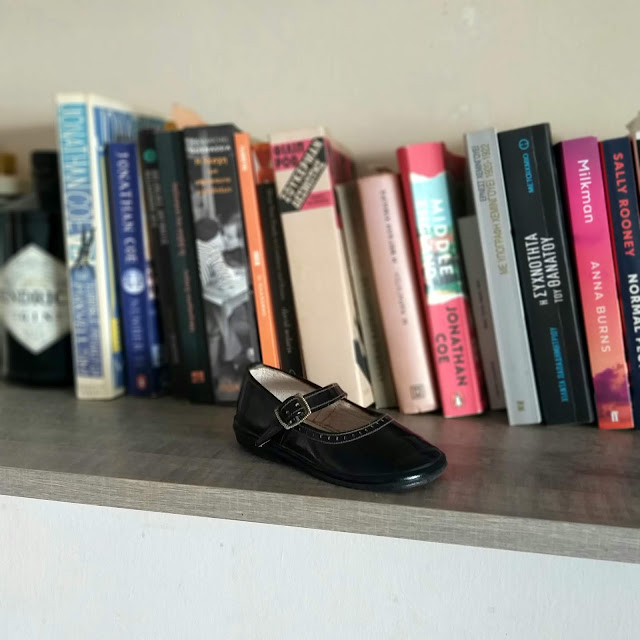Editorial#2
Written
by Dora Psoma
Translated
by Stavroula Giaritzidou
Thessaloniki.
30th day in lockdown. Today, I finally
cleared the winter wear out of my closet. Shuffling through a pile of bleached
T-shirts, handbags and scarves, I came upon a small box filled with odds and
ends. How original. Tucked away inside it though, in a velvet pouch, lay one of
my christening shoes –in all its Black and Mary Jane splendor! But let’s not
get too sentimental here.
Blowing
the dust off the shoe, I placed it on my bookshelf, right
next to Hemingway’s and Hilda Papadimitriou’s books. How many thoughts flashed
through my mind thanks to this teeny tiny keepsake, and these two authors.
Thought
#1:
I love them both dearly and, in a sense, consider them my mentors.
Thought
#2:
Where is the other pair?
Thought
#3:
Back in the 50s, Hemingway wrote a story about baby shoes. It goes like this:
“For
sale:
baby
shoes,
never worn”
This isn’t just the title of the
story, as one might assume.
This is the story itself. Legend has it that Hemingway was lunching with a
bunch of friends when they challenged him to come up with the shortest story
he could. Grabbing a pen from a waiter, he wrote six words on a restaurant
napkin. Exposition-rising action-resolution. Subject matter, plot, characters.
Diction. The epitome of brevity.
This story, in fact, was the inspiration for this week’s
editorial. We are struggling to communicate a message.
Our new normality cannot be easily put into words, yet we must grab a pen and paper
and confront it. Can someone be as laconic as Hemingway? Pick and combine words
as masterfully as he did?
Baby steps on our way to laconism, this unappreciated virtue.
This week, it is Tomaso Ferrando[1]
and Nick Pearce who grab
the pen and paper. The two academics address Covid-19 Crisis-related issues, in
the domain of economy and politics respectively. Their articles are informal
lessons in Economic Theory and Political Science, but don’t worry; there will
be no college finals.
As for the images featured, we
warmly thank Apostolis Rizos, visual communication consultant with “Tirfi” publications and “Les Yper Yper”. Merging two images in a diptych, he explores the
human brain’s tendency to combine different elements (“mental unification”),
and thus conceive new notions.
While I’m writing these final
lines, Spyros is taking a picture of my christening shoe. It’s definitely not
for sale. I wouldn’t fare well
in an informal laconism contest. What we are experiencing is hard to put into
a few words. But at least we can try to take the first steps. Baby steps.
This is a marathon. Keep
reading and start listening
*The
English version of the editorial is dedicated to Maria Potha. Maria, you
were my very own Mary Poppins, my first English Teacher, who taught me that
language is kindness through creativity.
---------------------
[1] We have broken down Tomaso’s article into three separate
parts, two of which were published today.
Εγγραφή σε:
Σχόλια ανάρτησης (Atom)
Αρχειοθήκη ιστολογίου
-
▼
2020
(18)
-
▼
Απριλίου
(9)
- Editorial #2 | Baby steps (EN) | by Dora Psoma
- Editorial #2 | Baby Steps | από τη Δώρα Ψωμά
- Covid-19 Μέρος Α: Μαθήματα Οικονομίας
- Covid-19 Μέρος Β: Εξωγενής απειλή;
- Μετά το Lockdown: Η βιοπολιτική του Covid-19
- Editorial #1 | Lockdown (EN) | by Dora Psoma
- Covid: Η Ηθική Νόσος
- Lockdown: Η ζωή μας ως μαραθώνιος
- Editorial #1 | Lockdown | από τη Δώρα Ψωμά
-
▼
Απριλίου
(9)










Δεν υπάρχουν σχόλια:
Δημοσίευση σχολίου